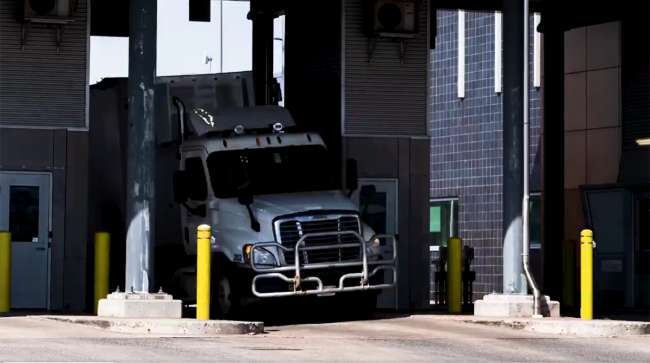Staff Reporter
Canadian Border Agency Staff Ratifies Labor Agreement

[Stay on top of transportation news: Get TTNews in your inbox.]
Unionized Canadian border agency staff members have ratified a tentative collective bargaining agreement.
Around 91% of Public Service Alliance of Canada and Customs and Immigration Union members working for the Canada Border Services Agency voted in favor of a four-year agreement that was provisionally announced June 11, they said July 4.
Between June 20 and July 4 more than 9,500 members of the unions voted on a deal, without which border crossings would have been snarled.
Around 5.5 million trucks crossed the border on a northbound journey in 2023, according to American Trucking Associations data, with U.S. exports to Canada by truck soaring 140% since 1995.
Members of PSAC and CIU at CBSA have overwhelmingly ratified their tentative agreement, with 91% of votes in favor. National ratification vote took place from June 20 to July 4. 🗳️https://t.co/2IKLcnwGAT — CIU-SDI (@ciu_sdi) July 4, 2024
PSAC members will see a 14.8% wage increase over four years, equivalent to a compounded rise of 15.73%. They also will receive a lump sum of C$2,500 and 12.5% extra pay for shift and weekend work.
Treasury Board of Canada Secretariat, which represented Canadian authorities in the talks, said when the tentative deal was announced that the collective agreement was fair for employees and reasonable for Canadians.
The unions said the contract will be signed in the coming weeks by the Treasury Board and CBSA, after which they have 180 days to raise employees’ wages, including retroactive pay.
Even though CBSA employees cannot walk off the job, state trucking associations and carriers had been preparing for much slower passage at border crossing points. During a labor action in 2021, trucks faced waits of four to five hours, C.H. Robinson Worldwide Vice President for Canada Mike Burkhart told Transport Topics as talks between the two sides progressed.
C.H. Robinson ranks No. 2 on the Transport Topics Top 100 list of the largest logistics companies in North America and manages 650,000 shipments across the Canadian border a year.
The top three U.S.-Canada border crossings by truck in 2023 were Detroit, Port Huron, Mich., and Buffalo-Niagara Falls, N.Y., according to Bureau of Transportation Statistics data.
Meanwhile, talks remain on hold between the two main Canadian railroads and the Teamsters Canada Rail Conference, a labor dispute that could have equally significant impacts on freight movements across North America.
Teamsters Vote To Reauthorize Strikes At CN And CPKChttps://t.co/T615StgA8N pic.twitter.com/XMocfQQvyc — Rail Conference (@TeamstersRail) June 29, 2024
Unionized employees at Canadian National Railway and Canadian Pacific Kansas City Railway on June 29 reauthorized strikes. CPKC’s railroad network spans large parts of the U.S. and Canada.
But all parties continue to await a Canada Industrial Relations Board determination on Minister of Labour Seamus O’Regan’s referral over whether halting the movement of propane, heavy fuel, food and water treatment materials would endanger the safety and health of the public.
CIRB on July 5, however, rejected a request to intervene in the dispute from the Maritime Employers Association. The trade group represents companies in Quebec and Ontario. A decision on the referral is expected by mid- to late July, the railroads said.
About 70% of freight moving among Canadian metropolitan areas and half the country’s export volume is transported by rail.
Want more news? Listen to today's daily briefing below or go here for more info:




